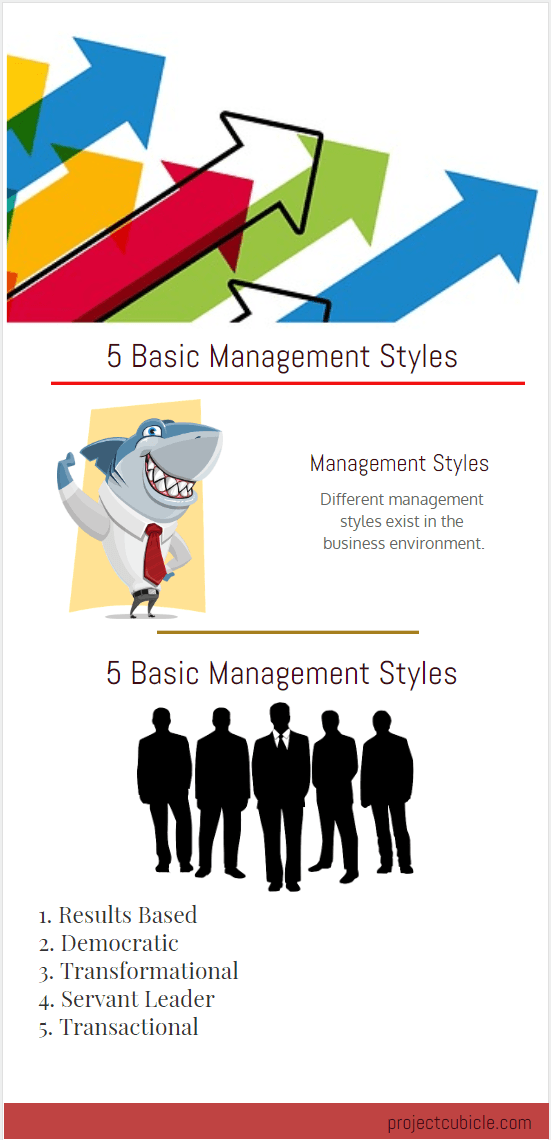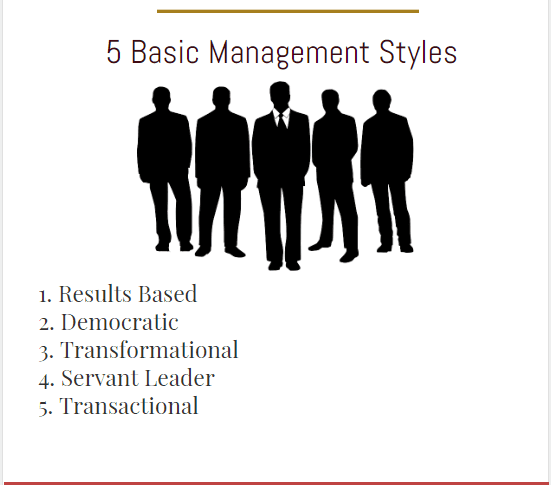Best Management Styles For Project Managers
Management is one of the most important tasks in business. Project managers have a large influence on how their team members work. They play a key role in team members and project success. Employees have the power to push the project forward, but they need skilled managers to guide them through the project goals. There are 5 management styles in business that every project manager should know about. In this article, we will cover the best management styles in business that are; Results-Based, Democratic, Transformational, Servant Leader, and Transactional.
Table of Contents
Discover Your Management Style
Different management styles exist in the business environment. As a project manager, your management style may evolve over time depending on the circumstances, project requirements, and team composition. Successful project managers are aware of the fact that every management style is not applicable to every situation. Because the characteristics of the team members are different from each other. Therefore, before managing people, you must discover your management style and be aware of your skills. However, this requires practice and experience.
What are the Five Management Styles in Business and Project Management?
Professionals and researchers may highlight various management styles depending on various circumstances. However, in this article, we will provide a list that we’ve gathered throughout our professional lives.
- Results-Based
- Democratic
- Transformational
- Servant Leader
- Transactional
Results-Based Management
The way that the project team follows to complete the task is not so important for the result-based managers. This management style gives more autonomy to team members while choosing the strategy to perform the task.
Advantages of Results-Based Management
Result-based management style can be motivating and effective because it creates an environment of mutual respect and it encourages team members to find better ways to complete the work.
Disadvantages of Results-Based Management
Although the result-based management style provides many advantages to an organization, it is not applicable to all projects and project teams. Because some of the team members may need more support than others. In addition to that, working more independently may cause conflicts in some circumstances. Therefore, this management style works best in project teams where team members are skilled and open to new ideas.
Democratic Management
Democratic managers encourage team members to participate in discussions and decisions rather than leaving them alone to do their work in an isolated manner. No matter what their role is, team members can come up with new ideas in a democratic work environment.
Advantages of Democratic Management
Democratic management style promotes happiness in the workplace and creates harmony in project teams because everybody joins decision-making while performing tasks. Therefore the final product will be built with their collective work. Since all the team members contribute to the conversation, this management style can be more effective in conflict management.
Disadvantages of Democratic Management
In democratic work environments, all the team members participate in decisions. However, everyone’s decision means sometimes no one’s decision. When the actions associated with decisions are not managed correctly or if there is uncertainty regarding the role of process owners, mistakes might be inevitable.
Therefore, you need to clarify which decisions should be made by the entire team members and which decisions should be made on their behalf. Furthermore, roles and responsibilities should be defined correctly to avoid uncertainties.
Transformational Management
Transformational managers inspire and motivate team members to focus on areas of change and innovate. Characteristics of a transformational manager include the following;
- Encourages team members to make decisions and take ownership of tasks
- Improves motivation and concentration
- Provides coaching when needed
- Inspires team members to embrace change
For example, Jeff Bezos (Amazon), Steve Jobs and Tim Cook (Apple), Heinrich Hiesinger (ThyssenKrupp) are transformational leaders. Are you surprised? – Note that innovation and change are inevitable in IT.
Advantages of Transformational Management
The transformational management style improves teamwork and collaboration. Team members become more effective in a short period of time. Adapting to changes skills and problem-solving skills of team members are advanced.
Disadvantages of Transformational Management
The transformational management style is not applicable all the time. People often work long hours to complete the tasks to achieve the organizational goals. This may cause unhappiness and employee burnout if they are not satisfied.
A transformational manager should know what motivates his/her team members and take action accordingly.
Servant Leader Management
The main goal of the servant manager is to serve the project team. Typically, a servant manager puts the needs of the employees first and helps them to perform as much as possible.
Advantages of Servant Leader Management
Servant leader management style crates happiness because this type of manager makes their project team feel that they care about them. This will often boost team performance.
Disadvantages of Servant Leader Management
When the servant leaders focus on solving every team member’s problems rather than managing the actual work to be done, they might become unsuccessful. Therefore, they need to find a balance between dealing with people and the requirements of real work.
Transactional Management
Transactional managers motivate their team members with a carrot and stick approach. They use rewards to improve their team’s performance and punishments if things are going bad. Team members are expected to obey the instructions of the manager.
Advantages of Transactional Management
Transactional management sets clear tasks to be followed which may be helpful for short-term targets. It may be useful under circumstances when there is a high risk or a serious problem regarding the project goals. It is also useful for crisis management in project management.
Disadvantages of Transactional Management
The transactional management style does not create a work environment where people explicitly participate in decision-making. Because the decisions are taken by the managers rather than team members. This might create unhappiness.
Last Words on the Best Management Styles For Project Managers
- Result-based managers have a clear understanding of the project goals/organizational objectives and focus on the outcomes.
- Democratic managers encourage decision-making within the project team.
- Transformational managers focus on change and innovation.
- Servant managers solve team members’ problems.
- Transactional managers use a reward and punishment system to improve the performance of team members.
Which management style do you think best suits you? Share your experiences regarding project management styles with the community through the comments box below.
See Also
Difference Between Leadership and Management
Further Reading
How to avoid “leisure suits,” “high waters,” and other career ending mistakes
Irwin Michael Reston is an expert who has more than 30 years of experience in optimizing businesses, inspiring individuals and improving human resources departments. He established the BlueLight Consulting Limited to provide learning and training service worldwide.












Using the proper management style for different projects will bring more successful results at the end.
every management have a different style , but this article can help to every management with getting new ideas or improving her style.